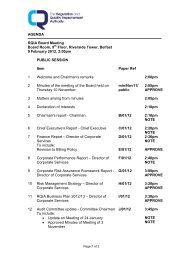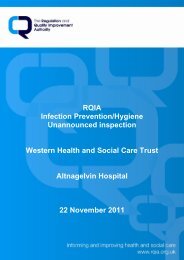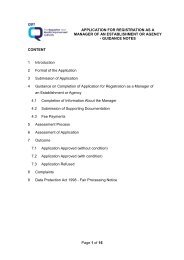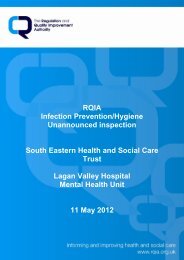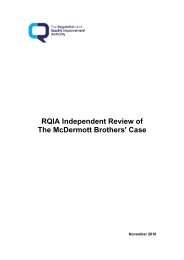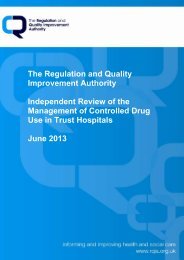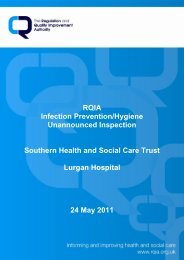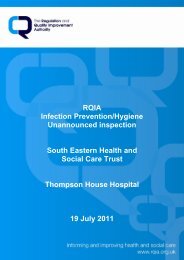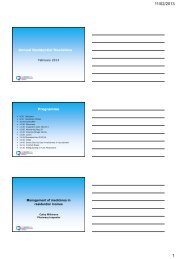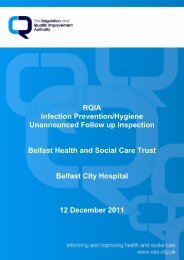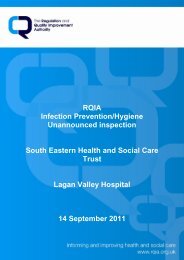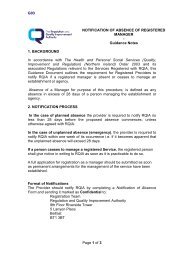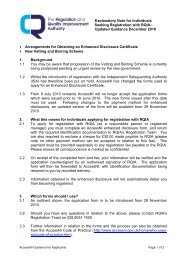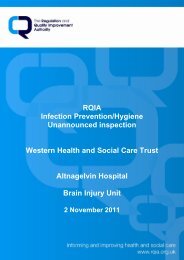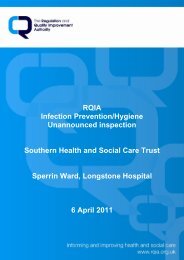Review of the Implementation of the Northern Ireland Single ...
Review of the Implementation of the Northern Ireland Single ...
Review of the Implementation of the Northern Ireland Single ...
Create successful ePaper yourself
Turn your PDF publications into a flip-book with our unique Google optimized e-Paper software.
video recordings involving trust carers to complement <strong>the</strong>ir training<br />
programme.<br />
Trusts request that staff complete a staff evaluation questionnaire at <strong>the</strong> end<br />
<strong>of</strong> <strong>the</strong>ir training sessions. Staff made <strong>the</strong> point that carer assessment training<br />
is not mandatory and many staff have not taken up training.<br />
4.1.2 Carer’s Support and Needs Assessment Tool<br />
All pr<strong>of</strong>essional staff interviewed stated that <strong>the</strong> Carer‟s Support and Needs<br />
Assessment Tool was <strong>the</strong> only carer assessment tool in use. Staff stated that<br />
a carer‟s assessment is always <strong>of</strong>fered and at various stages in <strong>the</strong> caring<br />
journey but not always accepted. There was a consensus <strong>of</strong> opinion that<br />
carers only took up <strong>the</strong> <strong>of</strong>fer <strong>of</strong> an assessment at crisis times and this may be<br />
attributed to <strong>the</strong> carer believing <strong>the</strong>y may receive more services.<br />
Carer‟s assessment and information guidance proposes that <strong>the</strong> assessment<br />
is carried out at a time convenient to <strong>the</strong> carer and that it may not always be a<br />
one- <strong>of</strong>f process. A variation in practice was noted with regard to completing<br />
<strong>the</strong> assessment. Some social work staff reported that <strong>the</strong>y would post to, or<br />
leave an assessment form with <strong>the</strong> carer and ask <strong>the</strong>m to complete as far as<br />
possible. They would <strong>the</strong>n contact <strong>the</strong> carer and arrange a time to discuss <strong>the</strong><br />
assessment with <strong>the</strong>m. O<strong>the</strong>rs said <strong>the</strong>y leave <strong>the</strong> form and <strong>the</strong> onus was on<br />
<strong>the</strong> carer to contact <strong>the</strong>m. The review team felt that staff should be<br />
encouraged to be proactive in completing carer‟s assessments and not put <strong>the</strong><br />
onus on <strong>the</strong> carer.<br />
Practitioners and managers raised <strong>the</strong> issue <strong>of</strong> <strong>the</strong> amount <strong>of</strong> time required to<br />
complete <strong>the</strong> assessment. This was due in <strong>the</strong> main to <strong>the</strong> time required to<br />
capture a more detailed consideration <strong>of</strong> <strong>the</strong> carer‟s perspective <strong>of</strong> caring and<br />
for <strong>the</strong> pr<strong>of</strong>essional time involved in personal contact, administration and<br />
follow-up work. Time required with carers to complete an assessment was<br />
dependent upon individual circumstances. The consensus was that it would<br />
take a minimum <strong>of</strong> two hours to complete a carer‟s assessment.<br />
All staff strongly indicated that <strong>the</strong>y were under a considerable amount <strong>of</strong><br />
pressure. Caseloads were high and <strong>of</strong>ten complex and <strong>the</strong>y felt that <strong>the</strong>y did<br />
not have enough time to address referrals for carer assessments in a timely<br />
manner.<br />
Some staff reported that if <strong>the</strong>y were dealing with <strong>the</strong> cared for person <strong>the</strong>y<br />
saw it as a potential conflict <strong>of</strong> interest to also address <strong>the</strong> carer‟s needs and<br />
hence made referrals for assessment to o<strong>the</strong>r social work teams. This could<br />
potentially delay <strong>the</strong> assessment process.<br />
Staff generally found <strong>the</strong> tool prompted discussion and gave <strong>the</strong> carer a good<br />
opportunity to talk about <strong>the</strong>ir issues. Staff were <strong>of</strong> <strong>the</strong> opinion that if <strong>the</strong> tool<br />
was used as intended i.e. as a means to include and empower <strong>the</strong> carer in<br />
<strong>the</strong>ir caring role, this was a tool to be embraced.<br />
36



